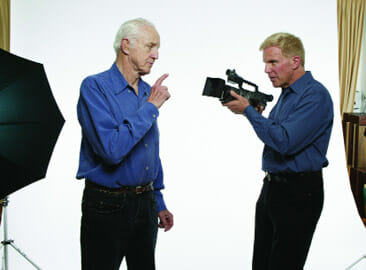Introducing Endless Mode: A New Games & Anime Site from Paste
If many more filmmakers decide to make documentaries about their difficult fathers, we’re going to need a name for them. Maybe dad docs. They include The Ballad of Ramblin Jack and My Architect, documentaries about men who left a big impact on the world but a largely different impact on their children, and it’s the children who are telling the stories, stories as much about their relationships with their fathers as about the men in the titles.
Add to this list the new film by Mark Wexler, Tell Them Who You Are. Wexler is the son of famous cinematographer Haskell Wexler, who shot One Flew Over the Cuckoo’s Nest and directed Medium Cool. Mark’s profile of his cantankerous dad is absorbing, thoughtful and funny, and it’s my favorite of the genre—if a genre is what we have—for several reasons. One is that Haskell is not only still alive, but he’s feisty as hell, full of energy and attitude, and still shooting movies, even as he pushes 80.
The second reason butts right up against the first: by picking up a camera and filming his dad, Mark is daring to step into his father’s world, a world his father knows inside out. Although Mark is an accomplished photographer and documentarian in his own right, this time it’s personal, and Haskell isn’t at all sure he likes the idea. Their relationship is clear from the beginning when Mark tries to interview his father, who halts everything to tell him he’s going about it all wrong.
But perhaps the best thing about Tell Them Who You Are is that Mark includes all the elements you’d expect—interviews with his dad, an overview of his career, clips from his movies and chats with famous people he’s worked with—but in each one he uncovers an idea, a sentiment that not only links the scene to the movie but rounds out an overall curiosity about what makes his dad, and dads like him, tick.
For instance, he talks with Michael Douglas who had the difficult job of being Haskell’s boss on Cuckoo’s Nest. It was his first time producing, and already he was dealing with a domineering cameraman who thought he knew better than everyone else on the set. Douglas tells some fun anecdotes, but he also mentions that Haskell reminded him of his own strong-willed dad, something Mark seems to find more interesting than show-biz talk. Mark visits with Jane Fonda who worked with Haskell and is not only a daughter of a famous actor but a famous mother as well, so she’s seen things from both sides, in a way.
In each interview, Mark finds a similarity, a parallel, as if he’s humming a song about overbearing dads, a poem about men from a certain generation, cut from a certain cloth, and keeping a certain distance from their kids. In a beautiful shot near the end of the movie, Mark asks for his dad’s help as he tries to get a shot of him swimming. He can’t quite get the focus right. With a few tips, he gets the scene, his father swimming toward the camera, the son zooming in closer, until they meet in the middle at the edge of the pool, clear as a bell.
In scenes like these, Tell Them Who You Are radiates dignity, the unusual warmth of the frustration of trying to know someone, the honesty and purpose lacking from movies that try too hard for irrelevant emotion. This clearly wouldn’t be Mark’s style, and it wouldn’t be Haskell’s either. Mark finally screens the film for his father, but he thankfully elides his reaction, reducing it to a few seconds that tell us what we need to know. At a screening in Toronto, an audience member asked Mark why he did this and to comment on his father’s response, and again he chooses to keep the moment between him and his dad, not because the bond between them is fragile, but because it’s real.
